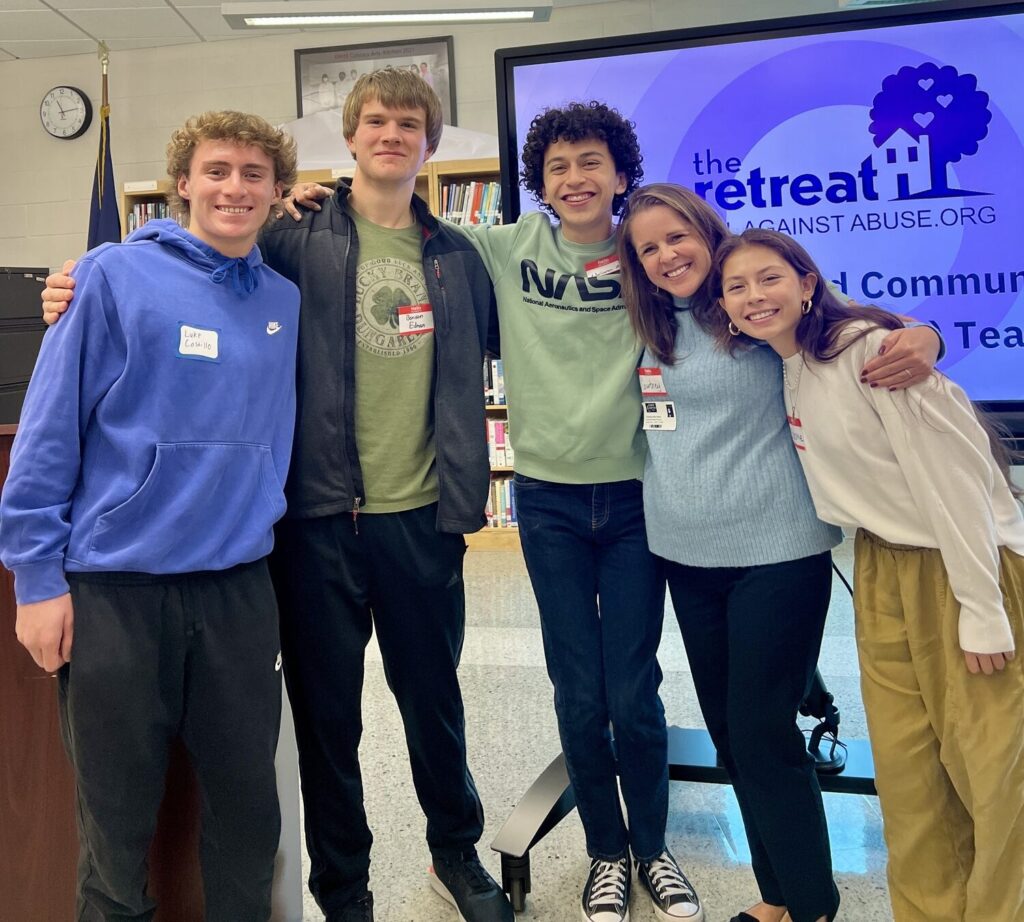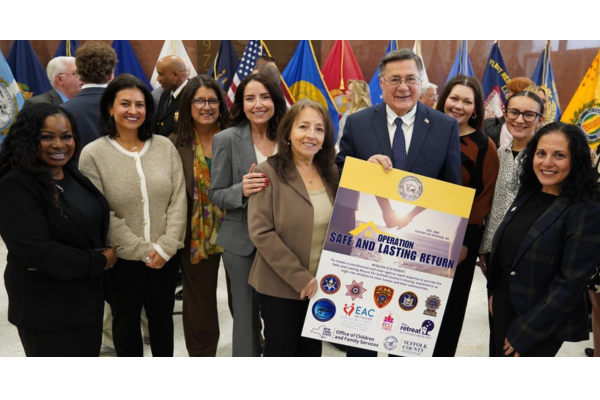Michelle Trauring on Feb 21, 2024 | 27East.com
SEE THE FULL ARTICLE SPREAD HERE.
A hot topic of conversation among Salome Galindo and her girlfriends at East Hampton High School is, perhaps unsurprisingly, love found and lost, and the relationships they immerse themselves in.
She can say, with certainty — through what she’s learned as a member of The Retreat’s Teen Leadership Council — that more than half of them have experienced an unhealthy one.
A hot topic of conversation among Salome Galindo and her girlfriends at East Hampton High School is, perhaps unsurprisingly, love found and lost, and the relationships they immerse themselves in.
And she is only 16.
“It’s really emotionally draining for them,” she said, “which they always tell me.”

February marks Teen Dating Violence Awareness Month, which shines a light on the abuse that some adolescents endure in their earliest romantic endeavors. Survivors of dating abuse are more likely to experience depression and anxiety, engage in drug use, exhibit antisocial behaviors like lying, bullying or hitting — and it can set the stage for future relationship problems.
“We like to explain that all couples have conflict, people disagree, but this is when one person feels like their way is the only way, and they’re willing to hurt,” Prevention Education Program Director Helen Atkinson-Barnes said. “And that could be physically hurt the other person, but it could also be pressure, manipulate and embarrass.”
Teen dating violence can include physical and sexual violence, psychological aggression, and stalking, according to the Centers for Disease Control and Prevention. One in 10 high school students face physical and sexual dating violence, Atkinson-Barnes said.
For emotional abuse, that number skyrockets to one in three, according to Loretta Davis, executive director of The Retreat.
“Sometimes it’s hard to gauge whether it’s increasing, or people are just more aware of pathways for support,” Atkinson-Barnes said of teen dating abuse. “So it may be a situation where, in the past, it was just kept quiet and people weren’t talking about it, and now people are coming forward. Do we attribute that to an uptick in abuse? Or is it just a matter of people feeling safer getting support?”
On the East End, the Teen Leadership Council itself plays a role, Davis said. Launched in 2010, the group creates a space for students to discuss what they notice happening in teen dating and other relationships, and teaches them how to prevent abuse and promote respect in all relationships.
“I can say that the prevention program that we have, I think why it’s so successful, is we’re not telling teens what to do,” she said. “They’re helping formulate what works. They are part of the solution and they’re part of the conversation in a big way, and I think respecting what they have to say is so important.”
“Our goal is to partner with youth,” Atkinson-Barnes said, “to learn from them and to have them learn from one another.”
Pop culture has normalized some signs of teen abuse, Atkinson-Barnes noted, including sharing online passwords, checking a partner’s phone, tracking someone’s location at all times, and isolating them from friends and family. What can feel fun can quickly turn “potentially dangerous and unsettling for a lot of teens when they get to that point,” she said.
Red flags that East Hampton High School juniors Adriano Rangel and Benson Edmond have either noticed, or learned through their time with the Teen Leadership Council, are lack of communication or over-communication — demanding contact when one partner is busy — or feeling pressure to be someone else in order to be more likable.
“I feel like nowadays, especially with the rise of online teen dating and social media overall, there has been this unhealthy romanticization of relationships, and being able to raise awareness of the unhealthy signs is very beneficial,” said Adriano, who is 16. “Nowadays, people don’t really know how to tell what healthy and unhealthy is.”
“It’s important to know the difference now that we’re young, than to experience it later on, like when we’re in college, or even in our jobs,” Salome said, adding, “I have one friend who, like, her boyfriend is really on her, like, ‘overprotective.’ That’s what she says.
“Now, I can find ways to tell her that’s not what it is, and it’s him just being really manipulative of her,” she continued. “I feel like we put a kind of makeup on it.”
Salome and Benson have learned that setting boundaries early in a relationship is key — “It isn’t a bad thing, it’s a great thing, because it helps a relationship thrive and continue to survive,” he said — as well as establishing healthy communication and compromise.
These tools can be used with any type of relationship, explained Courtney Hyland, associate director of education for The Retreat, including friends, teammates and family.
“I feel like with Teen Dating Violence Awareness Month, you think of violence prevention, you think of unhealthy, abusive things,” she said, “but we also focus a lot on healthy things — staying true to yourself, setting boundaries and knowing what those are and knowing what we need.”
In the coming month, Adriano said he hopes to start a new club at East Hampton High School — perhaps called “RAC,” which stands for Relationship Awareness Club — to help share what they have learned through the Teen Leadership Council and educate their peers on dating abuse, as well.
“If you think you’re in an abusive or unhealthy relationship, don’t be scared to either go for help or to try getting out of that relationship,” Benson said. “Because in the long run, it’ll be really beneficial, even if you’re gonna be really scared or really nervous of actually doing it, it’s crucial that you get out of it. And it’s not gonna be an easy task, but all that matters is that you’re out of that daunting experience in that relationship.”
“Or a toxic cycle, too,” Salome said. “You’re gonna find something much better with your own self or with someone else.”
For more information, visit allagainstabuse.org.
